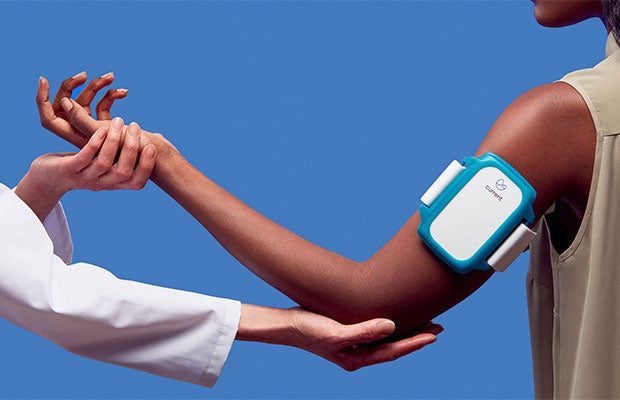

Combining Wearables and AI: A Value Play

Much of the buzz around artificial intelligence in health care has focused on diagnosing disease more accurately and improving operational efficiency. But another use of AI — to provide early warning to patients and their doctors that medical intervention may be needed — has begun to spark serious interest and action.
A National Health Service pilot program underway in southeast England is using AI, a telehealth platform and a Wi-Fi-enabled armband to remotely monitor vital signs of recently discharged patients to analyze their data in real time in an effort to reduce readmissions. The armband, which reportedly delivers continuous intensive care unit-level accuracy, was developed by startup Current Health. It uses algorithms that constantly analyze data on respiration rate, oxygen, pulse rate, skin temperature, posture and activity for warning signs and the system instantly alerts patients and caregivers if the data signal an emerging problem.
The Current Health system includes Bluetooth integrations with other devices to track patient metrics. Patients receive a tablet with a chatbot for Q&A, medication reminders and educational content. Patients also can connect with clinicians via video chat or text message to report symptoms or discuss care.
The system is used at four sites in England that serve a population of more than 500,000. The NHS reports a 22% reduction in home visits for discharged patients and decreased readmissions. Long-term adherence to treatment plans has increased to 96% compared with the field average of 50%.
The Food and Drug Administration in late March cleared the Current Health armband and telehealth platform for use in the U.S., and Mount Sinai Hospital in New York City has begun piloting the system as it tries to reduce readmissions.
A recent Harvard Business Review report notes that combining wearables and AI holds promise for providing affordable and convenient care solutions. With AI-driven models, it’s now possible to provide patients with interventions and reminders throughout the day-to-day recovery process, based on changes to their vital signs.
Grady Health in Atlanta has saved $4 million in preventing readmissions by using AI with patient data to determine which recently discharged patients were at risk for returning to its facilities for conditions that were preventable. Staff reached out to patients via in-person visits from their Mobile Integrated Health unit that comprises their emergency medical services team members.



